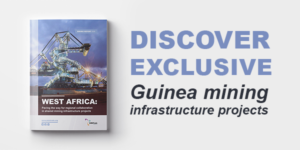Mines: Minister Bouna Sylla’s Agenda in 10 Points
Upon taking office at the head of the Ministry of Mines, the incoming Minister Bouna Sylla outlined his agenda in ten (10) points. Below, Guineenews offers an extensive excerpt from the speech of the brand new Minister of Mines and Geology.
“To make the sector more resilient to the fluctuations of the global economic environment and to ensure that the country benefits from the sector’s value chain, we will persist with determination in ongoing reforms and discussions to ensure compliance with the mining code and conventions, particularly on the following issues:
- Diversifying production through, among other things, the local processing of mining products to increase value chains. To this end, we will continue efforts to ensure companies meet their commitments regarding the construction of gold refineries, the transformation of bauxite into alumina and alumina into aluminum. Aluminum has now become one of the critical metals for the energy transition. This also involves the transformation of iron ore into steel as provided for in the founding agreements of the Simandou project, in accordance with the instructions of His Excellency the President of the Republic, implemented by the Strategic Committee of the Simandou Project.
The government will pragmatically evaluate the issue of the energy source needed to achieve this objective. We will work diligently with the relevant actors in the mining sector and other energy investors to find optimal energy solutions that enable rapid on-site transformation of our raw materials.
- In collaboration with tax and customs administrations, efficient collection of mining revenues to avoid transfer pricing and other tax optimizations that minimize state revenues from the sector. To this end, the Ministry of Mines will provide substantial support to the concerned services (Customs and Taxes), particularly by strengthening the control and monitoring of mining and geological activities and mining exports.
- Maximizing positive externalities, particularly in terms of local content. In this regard, each company will be required to implement a Local Content Plan with specific evaluation indicators (KPIs), allowing regular performance assessment and fair treatment of mining companies. Additionally, the state, particularly through the Subcontracting and Partnership Exchange, will support companies in strengthening their capacities.
- Close monitoring for compliance with ESG and EITI standards.
- Necessary support, reforms, and organization of artisanal gold mining, which is an economic opportunity despite significant risks to the environment and child labor through mass school dropouts in the affected regions.
- Improving relations between mining companies and local communities through organizing a stakeholders’ roundtable. This will be an opportunity to clarify the roles of each party to avoid incidents detrimental to state and company revenues, as well as to the communities.
- Rehabilitating mining sites in accordance with the environmental code, the mining code, other applicable texts, and internationally accepted industry standards.
- Establishing an approved mining plan within each company for sustainable exploitation to avoid high-grading.
- Operationalizing the African Mineral Development Centre (AMDC), an African Union institution that our country, as a founding member of the OAU, has the honor of hosting its headquarters.
- Finally, investments will be made in geological and mining research, particularly on critical metals essential for the energy transition. Following the instructions of the Head of State, we will develop, like other countries, an appropriate policy on critical metals.”






